小年到正月十五的春节习俗(中英双语)
春节习俗英语版
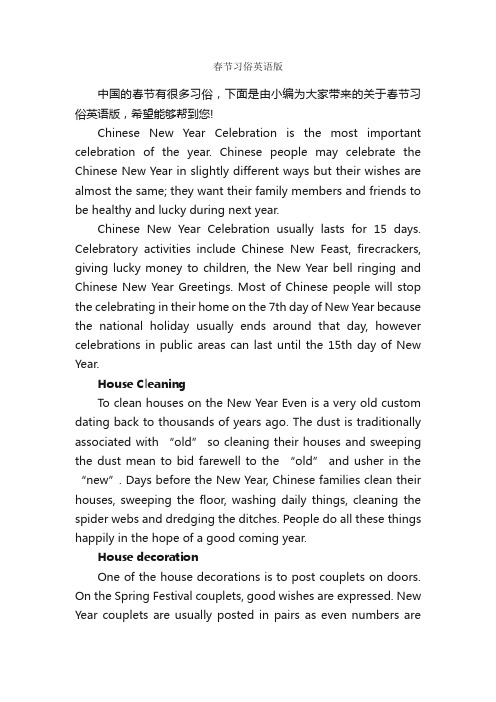
春节习俗英语版中国的春节有很多习俗,下面是由小编为大家带来的关于春节习俗英语版,希望能够帮到您!Chinese New Year Celebration is the most important celebration of the year. Chinese people may celebrate the Chinese New Year in slightly different ways but their wishes are almost the same; they want their family members and friends to be healthy and lucky during next year.Chinese New Year Celebration usually lasts for 15 days. Celebratory activities include Chinese New Feast, firecrackers, giving lucky money to children, the New Year bell ringing and Chinese New Year Greetings. Most of Chinese people will stop the celebrating in their home on the 7th day of New Year because the national holiday usually ends around that day, however celebrations in public areas can last until the 15th day of New Year.House CleaningTo clean houses on the New Year Even is a very old custom dating back to thousands of years ago. The dust is traditionally associated with “old” so cleaning their houses and sweeping the dust mean to bid farewell to the “old” and usher in the “new”. Days before the New Year, Chinese families clean their houses, sweeping the floor, washing daily things, cleaning the spider webs and dredging the ditches. People do all these things happily in the hope of a good coming year.House decorationOne of the house decorations is to post couplets on doors. On the Spring Festival couplets, good wishes are expressed. New Year couplets are usually posted in pairs as even numbers areassociated with good luck and auspiciousness in Chinese culture.People in north China are used to posting paper-cut on their windows. When sticking the window decoration paper-cuts, people paste on the door large red Chinese character “fu”A red "fu"means good luck and fortune, so it is customary to post "fu"on doors or walls on auspicious occasions such as wedding, festivals.Waiting for the First Bell Ringing of Chinese New YearThe first bell ringing is the symbol of Chinese New Year. Chinese people like to go to a large squares where there are huge bells are set up on New Year’s Eve. As the New Year approaches they count down and celebrate together. The people believe that the ringing of huge bell can drive all the bad luck away and bring the fortune to them. In recent years, some people have begun going to mountain temples to wait for the first ringing. Hanshan Temple in Suzhou, is very famous temple for its first ringing of the bell to herald Chinese New Year. Many foreigners now go to Hanshan Temple to celebrate Chinese New Year.Staying up late ("Shousui")Shousui means to stay up late or all night on New Year's Eve. After the great dinner, families sit together and chat happily to wait for the New Year’s arrival。
过年习俗(中英文)
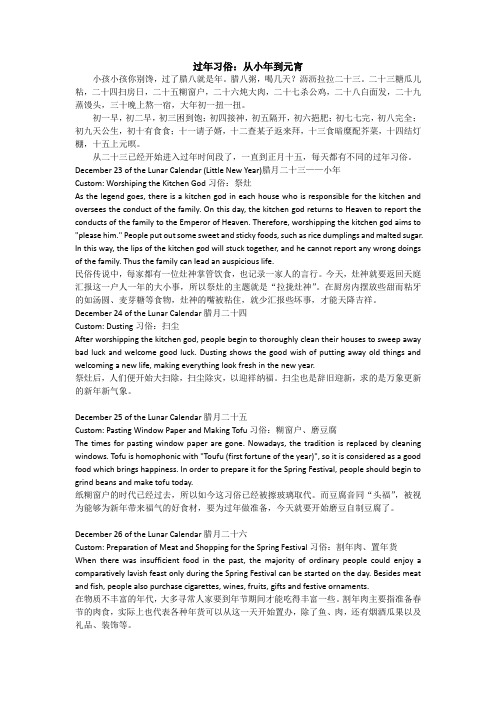
过年习俗:从小年到元宵小孩小孩你别馋,过了腊八就是年。
腊八粥,喝几天?沥沥拉拉二十三。
二十三糖瓜儿粘,二十四扫房日,二十五糊窗户,二十六炖大肉,二十七杀公鸡,二十八白面发,二十九蒸馒头,三十晚上熬一宿,大年初一扭一扭。
初一早,初二早,初三困到饱;初四接神,初五隔开,初六挹肥;初七七完,初八完全;初九天公生,初十有食食;十一请子婿,十二查某子返来拜,十三食暗糜配芥菜,十四结灯棚,十五上元暝。
从二十三已经开始进入过年时间段了,一直到正月十五,每天都有不同的过年习俗。
December 23 of the Lunar Calendar (Little New Year)腊月二十三——小年Custom: Worshiping the Kitchen God习俗:祭灶As the legend goes, there is a kitchen god in each house who is responsible for the kitchen and oversees the conduct of the family. On this day, the kitchen god returns to Heaven to report the conducts of the family to the Emperor of Heaven. Therefore, worshipping the kitchen god aims to "please him." People put out some sweet and sticky foods, such as rice dumplings and malted sugar. In this way, the lips of the kitchen god will stuck together, and he cannot report any wrong doings of the family. Thus the family can lead an auspicious life.民俗传说中,每家都有一位灶神掌管饮食,也记录一家人的言行。
用英语表达春节习俗

⽤英语表达春节习俗⽤英语表达春节习俗(精选13篇) 春节的习俗因地域、民族、⽂化、经济条件的影响,呈现出巨⼤的差异性,也铸就了丰富多彩的传统⽂化。
我们要发扬光⼤这种优秀的传统⽂化,推动⽂化⾛出中国,融⼊世界。
怎样⽤英语告诉外国朋友春节的传统习俗?下⾯是⼩编整理的⽤英语表达春节习俗(精选13篇),希望对⼤家有帮助。
⽤英语表达春节习俗篇1 Chinese Spring Festival celebrating the end of winter and the warmth of spring. It began in the last day of the lunar year, end in the 15th day of lunar New Year, also is the Lantern Festival. During the Spring Festival, people use red lantern and Spring Festival couplets decorate a house, put on all kinds of colored clothes, often visit friends and relatives or together eat dumplings, fish, meat and other delicious food. The children are looking forward to receiving red envelope money, and together they play each other the fireworks, with happy. Street with dragon and lion dance and some other carnival activities, CCTV will held the grand Spring Festival gala. 中国的春节庆祝冬天的结束和温暖春天的来临。
春节习俗英文简介_春节习俗有哪些

春节习俗英文简介_春节习俗有哪些春节是我国最重要的传统节日之一,春节文化历史悠久,关于春节的习俗数不胜数。
店铺为大家介绍一下关于春节习俗的英语介绍,欢迎大家阅读。
中国春节的英文介绍Spring Festival is the most important holiday for Chinese people. Excitement and happiness are palpable this time of the year,and they reach the peak on lunar new year‘s eve.春节对于中国人来说是最重要的节日。
在每年的春节都让人兴高采烈,尤其是大年三十那晚,更是达到了高潮。
Though the 15-day period, which starts with the first day of the lunar new year and ends on the 15th day (known as Lantern Festival), is relatively long, it is the busiest time of the year for Chinese people. The arrangements they have to make for family reunions,buying necessities and preparing food keeps them busy throughout the holiday. Many of them travel back home and meet friends over dinner and drinks. The celebrations include decorating the house and setting off fireworks.春节历时15天,也就从大年初一开始,到元月十五元宵节结束。
大年初一到十五的春节习俗(中英双语)

大年初一到十五的春节习俗(中英双语)大年初一:金鸡报晓The first day of Chinese New Year, also known as the “day of chicken”, officially begins at midnight.午夜零点时分,人们正式跨入新年第一天,也叫“金鸡报晓”。
It is traditional to light firecrackers and make as much of a din as possible to chase off the evil monster nian.传统习俗是,人们会燃放鞭炮,尽可能制造大的喧闹声赶走邪恶的妖怪“年”。
Most importantly the oldest and most senior members are visited with the visits strengthening family kinship.最重要的习俗是,人们会拜访家中最年长的长辈,以加强家人之间的亲情。
Senior members of the family hand out red envelopes containing cash (Chinese: ya sui qian), a form of blessing and to suppress aging and the challenges of the coming year, to junior members of the family, mostly children and teenagers.而家中的长辈会给晚辈(主要是儿童和青少年)红包(中国人称之压岁钱),代表着对晚辈的祝福,也是祈祷自己在来年身体康健、万事如意。
大年初二:金吠报春On the second day, married daughters usually go back to their own family to visit parents, relatives and close friends. Traditionally, married daughters didn’t hav e the opportunity to visit their birth families frequently.初二,出嫁的女儿会回娘家给父母、亲人和密友拜年。
元宵节习俗介绍中英文
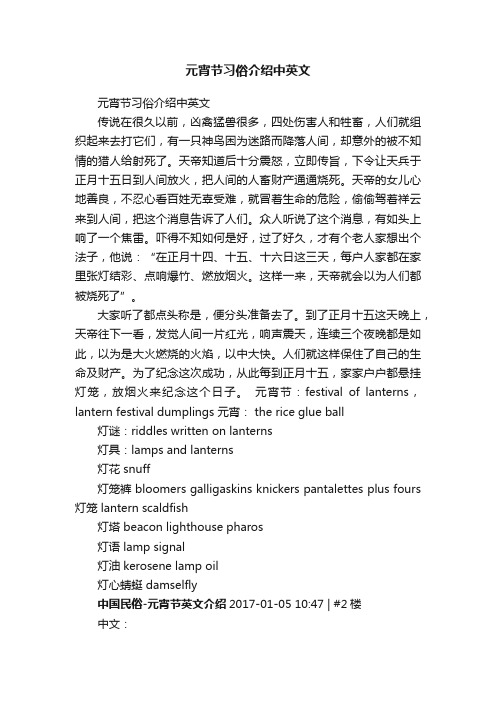
元宵节习俗介绍中英文元宵节习俗介绍中英文传说在很久以前,凶禽猛兽很多,四处伤害人和牲畜,人们就组织起来去打它们,有一只神鸟困为迷路而降落人间,却意外的被不知情的猎人给射死了。
天帝知道后十分震怒,立即传旨,下令让天兵于正月十五日到人间放火,把人间的人畜财产通通烧死。
天帝的女儿心地善良,不忍心看百姓无辜受难,就冒着生命的危险,偷偷驾着祥云来到人间,把这个消息告诉了人们。
众人听说了这个消息,有如头上响了一个焦雷。
吓得不知如何是好,过了好久,才有个老人家想出个法子,他说:“在正月十四、十五、十六日这三天,每户人家都在家里张灯结彩、点响爆竹、燃放烟火。
这样一来,天帝就会以为人们都被烧死了”。
大家听了都点头称是,便分头准备去了。
到了正月十五这天晚上,天帝往下一看,发觉人间一片红光,响声震天,连续三个夜晚都是如此,以为是大火燃烧的火焰,以中大快。
人们就这样保住了自己的生命及财产。
为了纪念这次成功,从此每到正月十五,家家户户都悬挂灯笼,放烟火来纪念这个日子。
元宵节:festival of lanterns,lantern festival dumplings 元宵: the rice glue ball灯谜:riddles written on lanterns灯具:lamps and lanterns灯花 snuff灯笼裤 bloomers galligaskins knickers pantalettes plus fours 灯笼 lantern scaldfish灯塔 beacon lighthouse pharos灯语 lamp signal灯油 kerosene lamp oil灯心蜻蜓 damselfly中国民俗-元宵节英文介绍2017-01-05 10:47 | #2楼中文:元宵节(The Lantern Festival)是中国农历正月的第十五天,这是新年的第一次满月,象征着和睦团圆。
元宵节是家庭团聚的传统佳节,最隆重的活动就是展挂各种各样的灯笼。
年初一到年十五传统春节风俗(中英文对照).

年初一到年十五传统春节风俗(中英文对照)说起圣诞节,估计大家都会滔滔不绝,但说起中国传统的春节,大家又知不知道怎么用英语来个简短介绍呢?赶紧来看看吧。
跟老外侃圣诞不算什么,不如侃侃春节。
不过很多这些风俗连小编自己都不了解,也许我们现在过的春节已经不是正宗的春节了吧。
New Year celebrations is a grand event of China. New Year festivitie lasts for one month in China. Chinese New Year is also called Spring festival. It begins from the middle of the last month of the year and ends up in the first month of the new year. These last day celebrations in China is called Lantern Festival.History of Chinese New Year 追溯历史:名叫“年”的怪兽ChineseNew Year has a very interesting and unique history. Accordingto the Chinese legends, there was a giant beast Nian who used to swallow humans in a single bite. Relief from the horrifying beast came only when people realized that Nian was scared of red color and loud noises.They started bursting crackers and used red color toscare the beast. Since then, this day was named as GuNian meaning "Pass over the Nian". Chinese considered the day an auspicious one as it brought new life for them and celebrated it as a New Year。
中国新年风俗英文简介知识分享

December 23th of the Lunar Calendar
Little New Year custom: worshipping the kitchen god
腊月二十三(小年) 习俗:祭灶
December 24th of the Lunar Calendar custom: dusting
December 30 of lunar calendar, also called “Chuxi” (New Year’s Eve), is the last day of the year according to lunar calendar. It means saying goodbye to the last year and welcoming the new year. Chuxi is to Chinese people what Christmas Eve is to Westerners.
12:00-18:00 Enjoying the Reunion Dinner & Giving Lucky Money
The two wonderful meals at this day are called “Reunion Dinners”, among which the New Year’s Eve Dinner is much more important.
腊月二十四 习俗:扫尘
After worshipping the kitchen god, people begin to thoroughly clean their houses to sweep away bad luck and welcome good luck. Dusting shows the good wish of putting away old things and welcoming a new life, making everything look fresh in the new year.
春节习俗初一到十五英语作文

春节习俗初一到十五英语作文英文回答:The Spring Festival, also known as Chinese New Year, is the most important festival in China and is celebrated by people all over the world. It is a time for family reunions, feasting, and celebrating new beginnings.The Spring Festival begins on the first day of thefirst lunar month and lasts for 15 days. During this time, there are many traditional customs and activities that are observed.Day 1:On the first day of the Spring Festival, people wake up early to greet the new year. They put on new clothes and gather with their families for a special breakfast. The traditional breakfast usually includes dumplings, which symbolize wealth and good fortune.Days 2-6:The next few days of the Spring Festival are typically spent visiting relatives and friends. People exchange gifts, give money in red envelopes, and wish each other a happy new year.Day 7:The seventh day of the Spring Festival is known as Renri, or "Day of the Human." On this day, people celebrate the birthday of humanity. Traditional activities on thisday include eating a special dish called jiaozi (dumplings), which symbolizes good luck.Day 8:The eighth day of the Spring Festival is known as Guazi Jie, or "Grain Festival." On this day, people celebrate the beginning of the spring planting season. Traditional activities on this day include eating a special cake calledguazi (sesame seeds), which symbolizes wealth and prosperity.Days 9-11:The ninth, tenth, and eleventh days of the Spring Festival are known as the "Three Cold Days." These days are typically the coldest of the year, and people stay indoors to stay warm. Traditional activities on these days include playing games, watching TV, and eating traditional snacks.Day 12:The twelfth day of the Spring Festival is known as Chu Xi, or "Rat's Eve." On this day, people prepare for the upcoming Lantern Festival by cleaning their homes and preparing special foods.Day 13:The thirteenth day of the Spring Festival is known as Yuan Xiao Jie, or "Lantern Festival." This day marks theend of the Spring Festival and is celebrated by eating yuanxiao (dumplings made of glutinous rice flour), watching fireworks, and setting off lanterns.Days 14-15:The last two days of the Spring Festival are known as "After the Lantern Festival." During these days, people relax and enjoy the last few days of the holiday.中文回答:春节习俗初一到十五。
春节的习俗英语翻译

春节的习俗英语翻译春节的习俗英语翻译春节,是集除旧布新、拜神祭祖、祈福辟邪、亲朋团圆、欢庆娱乐和饮食为一体的民俗大节。
春节历史悠久,起源于早期人类的原始信仰与自然崇拜,由上古时代岁首祈岁祭祀演变而来,在传承发展中承载了丰厚的历史文化底蕴。
下面是小编帮大家整理的春节的习俗英语翻译,供大家参考借鉴,希望可以帮助到有需要的朋友。
春节的习俗英语翻译篇1过年禁忌New Year taboos首先一点就是语言上忌讳。
过年的时候像"死"、"失败"、"病"这样比较晦气的话不能说。
打破碗碟也是忌讳。
如果不小心打破了,在场的人必须以迅雷不及掩耳盗铃儿响叮当之势,说上两句吉祥的顺口溜,如"岁(碎)岁平安","打发(大发,发财之意)"等来弥补。
Words can reflect New Year taboos. People tend to, for example, avoid negative words, such as "failing", "dying", and "illness" during New Year’s celebrations. Breaking a dish is another taboo in some places, because it implies that you will not have a thing to eat.很多地方过年的时候不能扫地,或者扫地时只能往屋内扫,不能往屋外扫,因为这样会把"财气"扫出去。
春节期间也不能扔垃圾,因为同样有可能扔掉"财运"。
但是现在,这些禁忌不太适合今天的生活了。
People do not carry the garbage out or clean the house on New Year’s Day or for the rest of the Spring Festival holiday, for fear of sweeping away good luck.春节期间也忌讳剃头。
春节习俗(中英文对照版)

春节习俗从农历正月初一开始的节庆活动可谓丰富多彩,多种多样。
A series of colorful celebration activities begin on the first day of the first lunar month.春节过了以后,就是在过去中国的农村里边,文艺的活动逐渐地展开了,有各种的文艺节目,像我们现在看到的北京花会一样,高跷、旱船,另外就是唱戏。
After the Spring Festival, all kinds of entertainment programs used to be given in the rural areas in China. Just like the flower exhibition in Beijing now, the entertainment programs include walking on stilt s, taking a boat on ground and operas.不管是城里人,还是在农村,人们都要做的一件事就是拜年。
民间流行的拜年活动先是从家里开始的。
No matter in the city or in the countryside, all the people will do one thing that is to extend Spring Festival greetings. This activity begins at first between family members.一般是我们晚辈要给长辈拜年,比如给父母和父母的兄弟姐妹,大爷、大妈等拜年。
Normally we will extend our Spring Festival greetings to our elders, such as our parents, uncles and aunts.亲戚之间在春节期间走动,有互拜平安的意思。
中国传统节日(中英文对照)
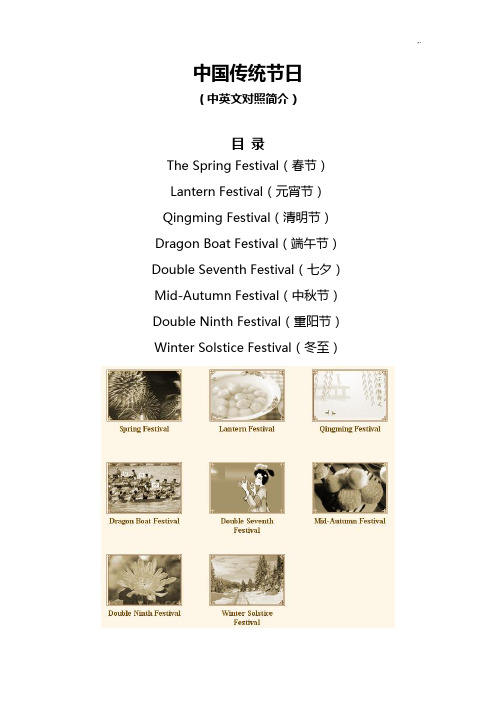
中国传统节日(中英文对照简介)目录The Spring Festival(春节)Lantern Festival(元宵节)Qingming Festival(清明节)Dragon Boat Festival(端午节)Double Seventh Festival(七夕)Mid-Autumn Festival(中秋节)Double Ninth Festival(重阳节)Winter Solstice Festival(冬至)The Spring Festival(春节)The first day of the first lunar month is the New Year in the Chinese lunar calendar. Among the traditional Chinese festivals, this is the most important and the most bustling. Since it occurs at the end of winter and the beginning of spring, people also call it the Spring Festival.Chinese have many traditional customs relating to the Spring Festival. Since the 23rd day of the 12th lunar montha, people start to prepare for the event. Every family will undertake thorough cleaning, do their Spring Festival shopping, create paper-cuts for window decoration, put up New Year picturesb, write Spring Festival coupletsc, make New Year cakesd, and also prepare all kinds of food to bid farewell to the old and usher in the new.New Year's Eve is the time for a happy reunion of all family members, when they sit around the table to have a sumptuous New Year's Eve dinner, talking and laughing, until daybreak, which is called "staying up to see the year out". When the bell tolls midnight on New Year's Eve, people eat dumplings. In ancient times, midnight was called zishi (a period of the day from 11 p.m. to 1 a.m.). Dumplings (jiaozi) are eaten because it sounds the same as "change of the year and the day" in Chinese.From the first day of the lunar year, people pay New Year calls on relatives and friends, which is an important custom for the Spring Festival.Setting off firecrackers is the favorite activity of children in the Spring Festival. According to legend, this could drive off evil spirits. The continuous sound of firecrackers can be heard everywhere, adding to the atmosphere of rejoicing and festivity.Many places hold temple fairs. The wonderful dragon lantern dance and the lion dance performances, along with various handicraft articles and local snacks attract thousands of people.With the development of the times, some changes have taken place inthe customs of spending the Spring Festival. For example, to prevent environmental pollution, many cities have banned firecrackers. But this does not have an impact on the happy atmosphere of the festival. On New Year's Eve, family members get together to have dinner while watching TV programs.For Chinese at home and abroad, the Spring Festival is always the most important festival.农历的正(zheng)月初一,是中国的农历新年。
春节的习俗 中英文对照
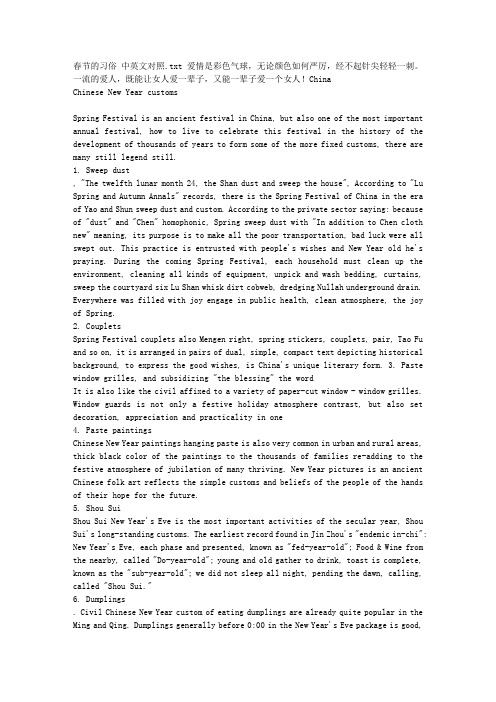
春节的习俗中英文对照.txt爱情是彩色气球,无论颜色如何严厉,经不起针尖轻轻一刺。
一流的爱人,既能让女人爱一辈子,又能一辈子爱一个女人!ChinaChinese New Year customsSpring Festival is an ancient festival in China, but also one of the most important annual festival, how to live to celebrate this festival in the history of the development of thousands of years to form some of the more fixed customs, there are many still legend still.1. Sweep dust, "The twelfth lunar month 24, the Shan dust and sweep the house", According to "Lu Spring and Autumn Annals" records, there is the Spring Festival of China in the era of Yao and Shun sweep dust and custom. According to the private sector saying: because of "dust" and "Chen" homophonic, Spring sweep dust with "In addition to Chen cloth new" meaning, its purpose is to make all the poor transportation, bad luck were all swept out. This practice is entrusted with people's wishes and New Year old he's praying. During the coming Spring Festival, each household must clean up the environment, cleaning all kinds of equipment, unpick and wash bedding, curtains, sweep the courtyard six Lu Shan whisk dirt cobweb, dredging Nullah underground drain. Everywhere was filled with joy engage in public health, clean atmosphere, the joy of Spring.2. CoupletsSpring Festival couplets also Mengen right, spring stickers, couplets, pair, Tao Fu and so on, it is arranged in pairs of dual, simple, compact text depicting historical background, to express the good wishes, is China's unique literary form. 3. Paste window grilles, and subsidizing "the blessing" the wordIt is also like the civil affixed to a variety of paper-cut window - window grilles. Window guards is not only a festive holiday atmosphere contrast, but also set decoration, appreciation and practicality in one4. Paste paintingsChinese New Year paintings hanging paste is also very common in urban and rural areas, thick black color of the paintings to the thousands of families re-adding to the festive atmosphere of jubilation of many thriving. New Year pictures is an ancient Chinese folk art reflects the simple customs and beliefs of the people of the hands of their hope for the future.5. Shou SuiShou Sui New Year's Eve is the most important activities of the secular year, Shou Sui's long-standing customs. The earliest record found in Jin Zhou's "endemic in-chi": New Year's Eve, each phase and presented, known as "fed-year-old"; Food & Wine from the nearby, called "Do-year-old"; young and old gather to drink, toast is complete, known as the "sub-year-old"; we did not sleep all night, pending the dawn, calling, called "Shou Sui."6. Dumplings. Civil Chinese New Year custom of eating dumplings are already quite popular in the Ming and Qing. Dumplings generally before 0:00 in the New Year's Eve package is good,until the time of the night to eat at midnight, when it is the beginning of the first lunar month, who started to eat dumplings to take "more-year-old to pay child" meaning, "son" to "neutrons "handed over" dumpling "homophonic, the" festive reunion "and" auspicious "means.7. FireworksChinese people have "opened the door of firecrackers," one said. That in the new year approaching, every family opened the first thing off firecrackers to beep beep sound of firecrackers Baba addition to the old and welcoming. Firecrackers is a specialty of China, also known as "bursting at war," "firecrackers", "firecrackers."8 .. Happy New YearNew Year's started this, people are up early, put on the most beautiful clothes, neatly dressed, go out to attempt to visit each other New Year and wish good luck for the coming year. Happy New Year a variety of ways, some with the patriarch led a number of people going door to door in New Year's; some colleagues from the nearby a few people go to New Year's; also have everyone together to congratulate each other, known as the "gathering." As the door New Year's time and effort, and later a number of elites and literati have to use the paste to vote each other He, thus developed in the later "New Year's card."9 .. New Year SisuEat cake, eat cake tastes vary. Beijingers like to eat glutinous rice or yellow rice cake made of red dates, mince rice cakes and white rice cakes. Hebei, others prefer to add jujube cake, small red beans and mung beans and other people steamed. Northern Shanxi, Inner Mongolia and other places in the New Year, used to eating yellow rice fried rice cakes, and some still wrapped in red bean paste, such as stuffing Zaoni, Shandong, others with yellow rice, red dates steamed rice cakes. North cakes with sweet-based, or steam, or deep-fried, it was also just stick candy. South cake is both savory and sweet, such as Suzhou and Ningbo, the cake, to rice production, light taste. In addition to steaming, deep-fried, it also can be sliced fried or soup. Sweet glutinous rice flour cakes with added sugar, lard, rose, osmanthus, mint, Su-rong and other ingredients, fine craftsmanship, can be directly coated with egg white fried or steamed food.Chinese New Year is called the night before the real reunion night of wandering away from home must be far behind thousands of miles to drive home the whole family sitting together dumplings to the New Year. 春节的习俗春节是我国一个古老的节日,也是全年最重要的一个节日,如何过庆贺这个节日,在千百年的历史发展中,形成了一些较为固定的风俗习惯,有许多还相传至今。
小年到除夕的习俗(中英双语)

小年到除夕的习俗(中英双语)春节是我国一个古老的节日,也是全年最重要的一个节日,中国人“过年”有哪些习俗?《腊月歌》有云:“二十三糖瓜粘;二十四扫房子;二十五磨豆腐;二十六去割肉;二十七宰公鸡;二十八把面发;二十九蒸馒头;三十晚上熬一宿,大年初一扭一扭。
”过去,中国人把从腊月初八开始的过年的准备过程,还编成了一个顺口溜:In the past, Chinese people started the preparation at the 8th of the last lunar month. There was even a piece of doggerel about the preparation.二十三,糖瓜粘;二十四,扫房日;二十五,碾白薯;二十六,炖牛肉;二十七,宰公鸡;二十八,把面发;发面,(就是)发酵嘛,二十九,蒸馒头;On 23, make candies; on 24, make a thorough cleanup; on 25, make sweet potatoes; on 26, brew beef; on 27, slaughter a rooster; on 28, prepare dough (To prepare dough means to make fermented dough); on 29, steam Mantou.小年习俗:二十三,糖瓜粘New Year (Chinese: Xiaonian), which falls about a week before the lunar New Year, is also known as the Festival of the Kitchen God, the deity who oversees the moral character of each household. In one of the most distinctive traditions of Spring Festival, a paper image of the Kitchen God is burned on Little New Year, dispatching the god's spirit to Heaven to report on the family's conduct over the past year. The Kitchen God is then welcomed back by pasting a new paper image of him beside the stove. From this vantage point, the Kitchen God will oversee and protect the household for another year. The close association of the Kitchen God with the Lunar New Year has resulted in Kitchen God Festival being called Little New Year.There are numerous customs associated with honoring the Kitchen God and determining the date of Little New Year. The date of this holiday was sometimes assigned according to location, with people in northern China celebrating it on the twenty-third day of the twelfth lunar month, and people in southern China celebrating it on the twenty-fourth. People make sacrifices to the Kitchen God on this day. A paper image is burnt dispatching the god's spirit to Heaven to report on the family's conduct over the past year. The Kitchen God is then welcomed back by pasting a new paper image of him beside the stove.you should know about the Little New Year, another sign of the start of spring.Offer sacrifices to Kitchen GodIn one of the most distinctive traditions of the Little New Year is the burning of a paper image of the Kitchen God, dispatchingthe god's spirit to Heaven to report on the family's conduct over the past year. The Kitchen God is then welcomed back by to the home through the pasting of a new paper image of him beside the stove. From this vantage point, the Kitchen God will oversee and protect the household for another year.The offerings to the Kitchen God include pig's head, fish, sweet bean paste, melons, fruit, boiled dumplings, barley sugar, and Guandong candy, a sticky treat made out of glutinous millet and sprouted wheat.Most of the offerings are sweets of various varieties. It is thought that this will seal the Kitchen God's mouth and encourage him to only say good things about the family when he ascends to heaven to make his report. The Kitchen God will be invited to sit in a sedan chair for his trip to heaven.Consequently, the day before Little New Year, the streets and alleyways are filled with vendors selling papier-mâché sedan chairs and paper gold and silver ingots for the Kitchen God's journey.Although very few families still make offerings to the Kitchen God on this day, many traditional holiday activities are still very popular.二十四,扫房子民谚称“二十四,扫房子”。
春节习俗:小年到十五 春节天天有讲究(英汉对照)

春节习俗:小年到十五春节天天有讲究(英汉对照)春节习俗:小年到十五春节天天有讲究Culture Insider: Traditional Spring Festival customs来源:中国日报网Spring Festival, which falls on the 1st day of the 1st lunar month is the most important festival in China and a time for family reunion, like Christmas in the West.农历正月初一开始,就到了中国最重要的节日春节。
人们阖家团圆,就如同西方的圣诞节一样。
Traditionally, Spring Festival starts in the early days of the 12th month of the lunar calendar and lasts until the middle of the 1st lunar month of the following year. With the modernization of China, some traditional customs are still followed today, but others have fallen by the wayside.传统意义上的春节始于农历腊月初,一直持续到来年的正月中旬。
随着中国的现代化,一些传统习俗被保留了下来,而另一些却逐渐消失在我们的视野中。
As we are preparing for the most important festival, let’s have a review of the traditional customs that celebrate the Spring Festival.在我们忙着准备这个重大节日的同时,不妨来回顾一下春节有哪些传统习俗吧。
元宵节风俗中英文版
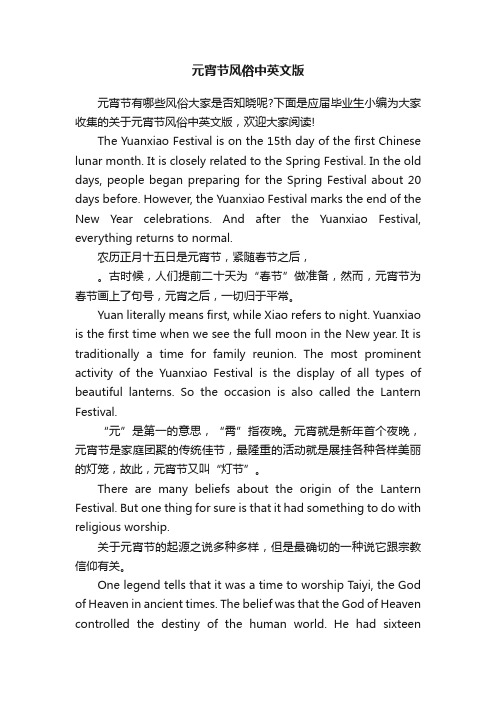
元宵节风俗中英文版元宵节有哪些风俗大家是否知晓呢?下面是应届毕业生小编为大家收集的关于元宵节风俗中英文版,欢迎大家阅读!The Yuanxiao Festival is on the 15th day of the first Chinese lunar month. It is closely related to the Spring Festival. In the old days, people began preparing for the Spring Festival about 20 days before. However, the Yuanxiao Festival marks the end of the New Year celebrations. And after the Yuanxiao Festival, everything returns to normal.农历正月十五日是元宵节,紧随春节之后,。
古时候,人们提前二十天为“春节”做准备,然而,元宵节为春节画上了句号,元宵之后,一切归于平常。
Yuan literally means first, while Xiao refers to night. Yuanxiao is the first time when we see the full moon in the New year. It is traditionally a time for family reunion. The most prominent activity of the Yuanxiao Festival is the display of all types of beautiful lanterns. So the occasion is also called the Lantern Festival.“元”是第一的意思,“霄”指夜晚。
春节的习俗双语

春节的习俗双语春节的习俗双语春节的起源蕴含着深邃的文化内涵,在传承发展中承载了丰厚的历史文化底蕴。
在春节期间,全国各地均有举行各种庆贺新春活动,带有浓郁的各地域特色。
下面为大家带来了春节的习俗双语,欢迎大家参考。
Festivities Schedule 春节活动Preparing the New Year starts 7 days before the New Years Eve. According to Chinese lunar calendar, people start to clean the house on Dec. 24, butcher on Dec. 26th and so on. People have certain things to do on each day. These activities will end Jan. 15th of the lunar calendar.新年的准备工作在除夕前的七天就开始了。
根据中国农历,人们从腊月二十四开始打扫屋子,二十六日杀猪宰羊等等。
每一天都有不同的活动,所有这些活动将在正月十五结束。
Customs and Practices 传统习俗Every family does a thorough house cleaning and purchases enough food, including fish, meat, roasted nuts and seeds, all kinds of candies and fruits, etc, for the festival period. Also, new clothes must be bought, especially for children. Red scrolls with complementary poetic couplets, one line on each side of the gate, are pasted at every gate. The Chinese character Fu is pasted on the center of the door and paper-cut pictures adorn windows.过年期间,每家每户都会做大扫除,购买丰富的食物,包括鱼肉坚果,水果糖果等。
- 1、下载文档前请自行甄别文档内容的完整性,平台不提供额外的编辑、内容补充、找答案等附加服务。
- 2、"仅部分预览"的文档,不可在线预览部分如存在完整性等问题,可反馈申请退款(可完整预览的文档不适用该条件!)。
- 3、如文档侵犯您的权益,请联系客服反馈,我们会尽快为您处理(人工客服工作时间:9:00-18:30)。
中英双语:小年到正月十五的春节习俗蔡章兵春节,也被称为农历新年。
对于中国人来说,这是规模最大,最重要的传统节日。
就如同西方的圣诞节一样,春节是一家团聚的日子。
过年吃什么?中英双语:小年到正月十五的春节习俗喜庆的中国年怎么能少得了“吃”这个主题?年节里的美味大多是和家人好友一同分享的,过年必吃美食包括年糕、长面条还有饺子。
Food is a big part of Chinese New Year celebrations, and many meals are eaten with family and friends. Some traditional dishes for the holidays are nian gao cake, long noodles, and dumplings.中英双语:小年到正月十五的春节习俗过年要大扫除吗?中英双语:小年到正月十五的春节习俗不等年来到,家家户户都打扫得干干净净。
除夕前,各式清扫工具也都妥妥收起来,因为不少人认为新年扫除会把好运也扫走的。
Homes are cleaned top to bottom before the beginning of the new year, and all cleaning equipment is put away before New Year's Eve because it's believed that good fortune may be swept away if cleaning is done on New Year's Day.中英双语:小年到正月十五的春节习俗过年跟谁玩中英双语:小年到正月十五的春节习俗中国的新年和春节放假讲求的是家人团聚,共庆佳节。
家人好友欢聚一堂,共享美味。
人们还会祭拜已故的亲人,孩子们则忙着收礼物,帮着节前打扫,盼着过正月十五元宵节。
The Chinese New Year's Eve and New Year's Day holidays are very family-centered celebrations. Many dinners are held with family and friends, deceased relatives are honoured, and children receive gifts and participate in traditions like cleaning ahead of the celebration and the Lantern Festival.中英双语:小年到正月十五的春节习俗过年咋布置?中英双语:小年到正月十五的春节习俗过年了各家的果盘里少不了橙子和桔子(拜年的人也会送),糖碟里会盛着八类果脯,还会用绿植鲜花来增添节日喜气,新年祝福也要用红纸书写。
Before New Year's Day, homes are decorated with trays of oranges and tangerines (which are also brought by visitors during the holiday), a candy tray with eight kinds of dried sweet fruits, and live plants and vases of fresh flowers. Wishes for the new year are written on red paper.中英双语:小年到正月十五的春节习俗过年穿什么中英双语:小年到正月十五的春节习俗红色是过年的主打色,它象征着光明和幸福的未来。
不仅大家喜欢过节穿红色,亲朋好友,特别是小孩子和单身汪还会收到长辈的红包以求好运。
Red is a key colour for New Year's celebrations, as it symbolizes a bright and happy future. People wear red clothing during the festivities, explains Colour Lovers, and children, unmarried friends, and close relatives are given little red envelopes with money inside for good luck.中英双语:小年到正月十五的春节习俗过年为啥放鞭炮?中英双语:小年到正月十五的春节习俗关于过年还有个传说,中国的新年跟打怪有关。
“年”其实是神话中的一种怪兽,会在新年的第一天来吃小孩子、牲口和粮食。
为了保护大家不受伤害,村民们将食物放在门口供“年”享用。
因为“年”惧怕红色和炮竹,过年大家便会挂红灯笼,放鞭炮。
Legend holds that the Chinese New Year began with a battle against a mythical beast called the Nian, who would come on the first day of the new year to eat children, livestock, and crops. In order to protect themselves from the Nian, villages put food in front of their doors believing that the creature would eat that and leave everything else alone. It was believed that the Nian was afraid of the colour red and firecrackers, so people would hang red lanterns outside and set off firecrackers.中英双语:小年到正月十五的春节习俗从小年到正月十五都有啥讲究?Spring Festival, which falls on the 1st day of the 1st lunar month, is the most important festival in China. It's a time for family reunion, like Christmas in the West.农历正月初一开始,就到了中国最重要的节日——春节。
人们阖家团圆,就如同西方的圣诞节一样。
Traditionally, Spring Festival starts in the early days of the 12th month of the lunar calendar and lasts until the middle of the 1st lunar month of the following year. With the modernization ofChina, some traditional customs are still followed today, but others have fallen by the wayside.传统意义上的春节始于农历腊月(即十二月)初,一直持续到来年的正月(即一月)中旬。
随着中国的现代化,一些传统习俗被保留了下来,而另一些却逐渐消失在我们的视野中。
Chinese will celebrate the Lunar New Year on Jan 28 this year, which is also the Year of the Rooster according to the Chinese zodiac. As we are preparing for the most important festival, let's have a review of the traditional customs that celebrate the Spring Festival.今年中国的农历新年是公历一月二十八日,轮到了中国十二生肖里面的鸡年。
在我们忙着准备这个重大节日的同时,不妨来回顾一下春节有哪些传统习俗吧。
中英双语:小年到正月十五的春节习俗腊月二十三:送灶上天中英双语:小年到正月十五的春节习俗Little New Year, which falls the 23rd day of the 12th month in the Lunar calendar, is also known as the Festival of the Kitchen God, the deity who oversees the moral character of each household.农历腊月二十三日是小年,也是祭灶节。
灶神在中国神话传说中监管一家善恶。
People make sacrifices to the Kitchen Gold on this day. A paper image is burnt dispatching the god's spirit to Heaven to report on the family's conduct over the past year. The Kitchen God is then welcomed back by pasting a new paper image of him beside the stove.人们在小年这一天祭拜灶神,焚烧灶神的画像,意味着送灶神上天,禀报这家人在过去一年的德行。
接着人们会在灶旁贴上新的画像,意味着再把灶神接回来。
中英双语:小年到正月十五的春节习俗腊月二十四:扫舍去尘中英双语:小年到正月十五的春节习俗Families undertake thorough house cleaning on the 24th day of the 12th month in the Lunar calendar, sweeping out the old in preparation for the coming year.农历腊月二十四日,各家各户会进行大扫除扫舍去尘,预示着除旧迎新。
According to tradition, ghosts and deities must choose either to return to Heaven or to stay on Earth during the last month of the year. It is believed that to ensure the ghosts and deities' timely departure, people must thoroughly clean both their bodies and their dwellings, down to every last drawer and cupboard.根据传统,各路鬼神在农历腊月必须决定自己是返回天庭还是继续留在人间。
